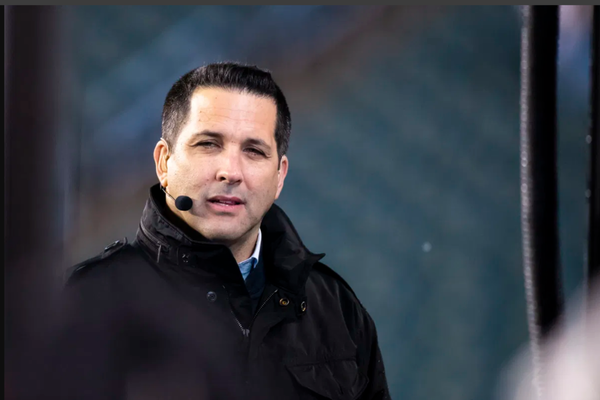

In the wild world of sports media, controversies can pop up out of nowhere, often linked to big personalities. Well, Adam Schefter, a familiar name in NFL reporting, has found himself at the center of a heated discussion. And that too about accountability and the challenges of watching live sports legally. So what’s really happening out here?
So, here’s the scoop! Schefter tweeted a highlight from the Jets–Texans game, but it wasn’t just any video. It had a watermark from MethStreams.com, infamous for sharing pirated content. This was a risky move, considering that Thursday Night Football is supposed to stream exclusively on Amazon Prime.
No TD.
Fumble.
Texans ball. pic.twitter.com/UClFEqVm3R— Adam Schefter (@AdamSchefter) November 1, 2024
ADVERTISEMENT
Article continues below this ad
Fans wasted no time calling him out, pointing out that he should know better. One fan even quipped, “Top NFL insider using MethStreams while the NFL is trying to move the whole league to Amazon Prime.” Pretty harsh, right? But it reflects a real frustration that many have with how sports streaming is set up.
This isn’t just about Schefter. His little slip-up shines a spotlight on the bigger issue of piracy in sports. The NFL has been fighting hard against illegal streams, claiming they lose around $28 billion a year to these practices. When a prominent figure like Schefter seemingly endorses viewing games through sketchy sites, it raises eyebrows and questions the league’s anti-piracy efforts. It’s a bad look when even top insiders are caught up in the mess. Fans’ frustration was palpable. If someone like him can’t navigate the streaming game correctly, what hope do regular fans have?
His situation adds another layer to the ongoing debate about accessing sports content. With multiple streaming services and their running costs, viewers often hit roadblocks that push them to seek out illegal avenues. Many fans aren’t choosing piracy because they prefer it; they’re simply trying to catch their teams play without breaking the bank. Schefter’s case makes it clear that even industry veterans face the same hurdles as everyday fans when it comes to accessing live games.
ADVERTISEMENT
Article continues below this ad
Adam Schefter and the streaming conundrum
Now, let’s dive deeper into the messiness of sports streaming. The Jets–Texans game was a big deal, and with the Jets looking for a win, the excitement was through the roof. However, the frustration among fans about how to actually watch the game legally is a major roadblock. The game generates buzz, yet many feel they’re stuck in this tight spot with rising subscription fees and limited access. Some fans even joked about reconsidering their Amazon Prime subscriptions after seeing Schefter’s choices.
What’s your perspective on:
Is the NFL's anti-piracy stance failing when top insiders resort to illegal streams?
Have an interesting take?
As the NFL shifts its strategy towards exclusive streaming platforms, the conversation around accessibility absolutely heats up. Sure, tackling modern viewing habits is important, but when it pushes loyal fans toward illegal streams, it creates a big problem. Schefter’s incident shines a spotlight on this issue, showing just how urgent it is for leagues to rethink their approaches to broadcasting.
On top of that, leagues like the NFL, NBA, and UFC are trying to tackle this piracy problem together. It seems they’re realizing that two heads are better than one when it comes to fighting illegal streaming. Their goal is to protect their intellectual property while still making it easy for fans to watch games without frustration. Now that’s a balancing act that needs a solid strategy.
ADVERTISEMENT
Article continues below this ad
In the context of Schefter’s slip-up, it’s clear that the sports industry could benefit from some fresh ideas. Rethinking pricing models, providing better access, and simplifying the viewing experience could go a long way in reducing the allure of illegal streams. After all, Schefter’s situation is a reminder of how interconnected these issues are and how they need to be tackled together.
ADVERTISEMENT
ADVERTISEMENT
ADVERTISEMENT
ADVERTISEMENT


Is the NFL's anti-piracy stance failing when top insiders resort to illegal streams?